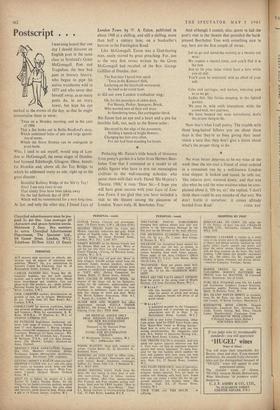Postscript . • •
'Twos on a Monday morning, and in the year of 1884
That a fire broke out in Bailie Bradford's store, Which contained bales of jute and large quanti- ties of waste, Which the brave firemen ran to extinguish in great haste.
Who, I used to ask myself, would sing of Lon- don as McGonagall, the sweet singer of Dundee, had hymned Edinburgh, Glasgow, Oban, beauti- ful Monikie and, above all, the Tay Bridge, to which he addressed many an ode, right up to the great disaster :
Beautiful Railway Bridge of the Silv'ry Tay !
Alas! I am very sorry to say That ninety lives have been taken away On the last Sabbath day of 1879 Which will be remembered for a very long time.
Al last, and only the other day, I found Lays of London Town, by W. A. Eaton, published in about 1908 at a shilling, and still a shilling, more than half a century later, on a bookseller's barrow in the Farringdon Road.
Like McGonagall, Eaton was a God-fearing man, easily moved by great preaching. For, just as the very first verses written by the Great McGonagall had recalled, of the Rev. George Gilfillan of Dundee, that :
The first time I heard him speak 'Twos in the Kinnaird Hall, Lecturing on the Garibaldi movement, As loud as he could bawl.
so did our own London troubadour sing:
Oh, for the preachers of olden days,
For Binney, Parker, Spurgeon, Brock, Who warned men of their evil ways In thundering tones, like earthquake shock.
But Eaton had an eye and a heart and a pen for humbler folk, too, such as the flower-seller :
She stood by the edge of the pavement, Holding a bunch of bright flowers :
Changing her feet very often, For she had been standing for hours.
Prefacing Mr. Eaton's little bunch of blossoms from poesy's garden is a letter from Herbert Beer- bohm Tree that I commend as a model to all public figures who have to trot out meaningless civilities to the well-meaning nobodies who pester them with their work. Dated 'His Majesty's Theatre, 1906,' it runs, 'Dear Sir,—I hope you will have great success with your Lays of Lon- don Town. I am glad that you have included a visit to the theatre among the pleasures of London. Yours truly, H. Beerbohm Tree.'
And although I cannot, alas, quote in full the poet's visit to the theatre that provided the hard- pressed Beerbohm Tree with something nice fo say, here are- the first couple of verses:
Let us go and spend the evening al a theatre out west :
We require a mental tonic, and you'll find it is the best Just to let your inner vision have a turn while you sit still; You'll soon be interested, with no effort of your will.
Cabs and carriages, and motors, whining past us as we go,
Ladies fair, like fairies stepping, in the lighted portico.
We pass in, with smile triumphant, while the crowd wait, two and two; We have booked our seats beforehand, that's the proper thing to do.
Now that's what I call poetry. The trouble with those long-haired fellows you see about these days is that they're so busy giving their inner vision a turn that they don't give a damn about what's the proper thing to do.
No wine better deserves to be my wine of the week than the yin rosé a friend of mine ordered in a restaurant run by a well-known London wine shipper. It looked and tasted, he tells me, 'like inferior port, watered down,' and that was also what he told the wine-waitress when he com- plained about it. 'Oh no, sir,' she replied, 'I don't think there could be any mistake of that sort. We don't bottle it ourselves: it comes already






































 Previous page
Previous page